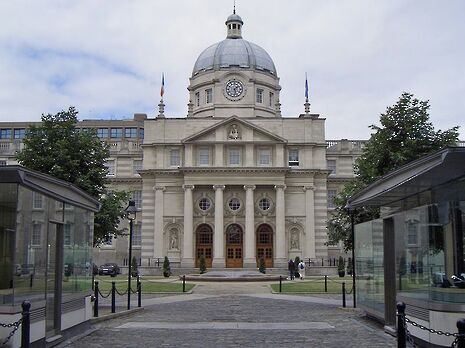More meme than MP: the crisis of Anglo-Irish political dignity
In her second column, Nadia Hourihan notes how British politicians blundering through Brexit seem to be following in Ireland’s defensive yet self-depreciating footsteps

“With all due respect, in the most unparliamentary language, fuck you Deputy Stagg! Fuck you!”
“Eh-eh-eh-excuse me.”
“I apologise now for my use of unparliamentary language.”
“Deh-deh-deputy Gogarty, that is most unparliamentary language.”
I was only a week into Michaelmas of my first year when an English friend quoted the above exchange to me, which took place in the Dáil (the Irish lower house) in December 2009.
The common thread running through my discussions about Irish politics in Cambridge is Deputy Stagg’s f-bomb. The popularity of this bizarre clip is surprising, until you think about the meme-centric ways in which people consume politics today. We are the consumers of humiliation, cockups, and blunders before we are the responsible consumers of serious journalism.
“On a world stage, the UK is throwing a tantrum with its most important trading partner: the European Union. This is proving to be more self-sabotage than the desired assertion of sovereignty”
For the Irish, this requires very little psychological adjustment. The Irish have long known that our political establishment is just a little embarrassing. Irish politicians swaggered around the country, making promises as big as their egos, without ever having enough money in the national pockets to get away with acting like big spenders. From the inception of the Free State, politicians have merrily defaulted on the promises they made to the public. And once the Celtic Tiger finally bloated our balance sheets, the financial crash that followed hardly helped us take ourselves more seriously. If anything, the last twenty years have conditioned the Irish to be extra-cynical of self-styled financial Messiahs.
On a world stage, Ireland periodically threw tantrums with its most important trading partner: Britain. Time and time again, this proved to be more self-sabotage than the desired coup de grace. The gulf between how Ireland has seen itself (serious, important, the centre of the universe, the land of Yeats and Wilde), and how it has been seen abroad (not so serious, not so important, an Atlantic backwater, the land of Father Ted and Mrs Brown’s Boys) has generated a jealously guarded self-deprecation. The Irish have licence to say vicious things about ourselves, but if anyone else dares to giggle at Irish foibles we hiss in outrage.
But social media is like a Trojan horse, built to smuggle international spectators into the pits of the national psyche. Anyone who follows the online musings of Irish people can get in on the jokes we make at our own expense: Simon Harris, the Minister for Health is not-so-secretly a vampire, TD (MP) Jack Chambers has never seen his own nipples, and former Taoiseach (Prime Minister) Enda Kenny is behind the deaths of animals at Tayto park (a rural theme park) – all hilarious hearsay. Irish Twitter can be a very strange place, and the nature of our online lives has welcomed the world to gape at our perversions.
Ireland’s successful defence of the national interest in December’s Brexit negotiations will leave less of a mark in the minds of young people than our accidental legalisation of ecstasy, crystal meth and mushrooms in 2015, Gerry Adams’ weird, weird tweets, or even Leo Varadkar’s tank tops – all of which are simply more meme-worthy than EU negotiations.
But, for what feels like the first time, the UK is suffering through a crisis of seriousness alongside us.
Like Ireland, the UK is struggling to take its politics seriously. The Brexit referendum has infantilised parliament, which now must pursue what it considers to be an act of national self-sabotage. British politicians scramble to appease diametrically opposed groups of people, with diametrically opposed promises. Serious questions are being asked of the health of the government’s supply and confidence agreement. The Conservative Party’s three-legged race with the DUP might yet collapse before the finish line.
On a world stage, the UK is throwing a tantrum with its most important trading partner: the European Union. This is proving to be more self-sabotage than the desired assertion of sovereignty. The gulf is perceptible between how the UK sees itself (serious, a great power, the land of Churchill and Shakespeare), and how it is seen abroad (not so serious, a declining power, the land of Farage and Katie Hopkins).
It all sounds eerily familiar.
So, when next you see a Maybot meme, or even find yourself laughing at your local MP’s most unparliamentary language, know that the Irish have been through the same crises of seriousness.
History repeats itself, first as tragedy, and then as endless iterations of Fianna Fáil governments. I wish neither upon the British people. But I do urge attention to Irish history, for there are lessons to be learned from it. A crisis of seriousness threatens a nation’s dignity – scapegoats must be found. For the Irish, a contempt for Britain has been exploited to make up for a slighted sense of self. I can only hope that the British don’t find such a punching bag in the European Union
 News / ‘Out of the Ordinary’ festival takes over Cambridge 26 August 2025
News / ‘Out of the Ordinary’ festival takes over Cambridge 26 August 2025 News / Government pulls £277M in funding for Cambridge sewage works relocation25 August 2025
News / Government pulls £277M in funding for Cambridge sewage works relocation25 August 2025 News / Tompkins Table 2025: Trinity widens gap on Christ’s19 August 2025
News / Tompkins Table 2025: Trinity widens gap on Christ’s19 August 2025 Comment / Who could possibly want more exams?25 August 2025
Comment / Who could possibly want more exams?25 August 2025 News / News in Brief: Brain breakthroughs, bouldering, and the ‘broligarchy’24 August 2025
News / News in Brief: Brain breakthroughs, bouldering, and the ‘broligarchy’24 August 2025









